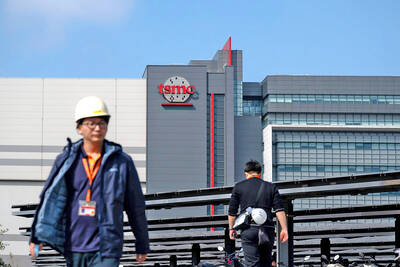VIETNAM
Central bank calms market
The State Bank of Vietnam yesterday sought to calm markets after investors sold financial stocks, and customers of the nation’s fifth-largest commercial bank raced to withdraw their savings following a police probe into a prominent real-estate tycoon. The benchmark index and bank stocks plunged after police over the weekend announced the detention of Truong My Lan, chairwoman of Van Thinh Phat Holdings Group, and other company officials for allegedly obtaining property through fraudulent means. The move was in relation to an investigation into the issuance and trading of bonds in which vast sums of currency were allegedly appropriated in 2018 and 2019.
SINGAPORE
MAS urges greater scrutiny
The Monetary Authority of Singapore (MAS) yesterday urged asset managers to ramp up pressure and scrutiny on environmental, social and corporate governance issues in their portfolio companies. “We encourage institutional investors to take the lead in exercising responsible investor stewardship,” MAS Deputy Managing Director Ho Hern Shin (何亨申) said at a corporate governance conference. This could be done through engagement with companies and proxy voting, she added. On pay transparency, Ho said it was “concerning” that most listed companies do not adhere to laws requiring disclosure of how much their CEOs and directors are paid.
AUTOMAKERS
Renault in Nissan sale talk
Renault SA’s stock surged after the automaker confirmed talks that could lead to the French company cashing in some of its 6.1 billion euros (US$5.9 billion) of shares in alliance partner Nissan Motor Co. The stock rose as much as 6.6 percent as of 9:30am yesterday in Paris after Renault said that it was discussing several initiatives with Nissan. The talks include the Japanese manufacturer potentially investing in the new electric vehicle entity that Renault is planning to create. People familiar with the matter said that as part of these talks, Renault is open to reducing it stake in Nissan, a prospect that has been cheered by several analysts.
ENERGY
Energean gas flow tests start
Energean PLC has begun pumping gas to its floating production facility in the offshore Karish gas field as part of reverse flow testing procedures approved by the Israeli government, the London-listed energy group said on Sunday. The testing phase is an important step in the commissioning process of the so-called FPSO Energean Power facility, it said. The development of the Karish field, about 80km west of the Israeli city of Haifa, has raised tensions between Israel and Lebanon in their protracted dispute over maritime boundaries. The US has been mediating indirect talks on the issue since 2020.
FINANCE
Auto debt market risks high
Ark Investment Management LLC founder and CEO Cathie Wood yesterday flagged the risk of “serious losses” in the trillion-dollar auto debt market, after statistics showed that used vehicle prices in the US decreased last month. Writing on Twitter, Wood cited a shift in consumer tastes toward electric vehicles as leading to a drop in the price of gasoline-powered vehicles. Wood also posted data released by Manheim Auctions, the world’s largest reseller of used vehicles. That organization’s US Used Vehicle Value Index showed a 3 percent drop last month from August.

Apple Inc has closed in on an agreement with OpenAI to use the start-up’s technology on the iPhone, part of a broader push to bring artificial intelligence (AI) features to its devices, people familiar with the matter said. The two sides have been finalizing terms for a pact to use ChatGPT features in Apple’s iOS 18, the next iPhone operating system, said the people, who asked not to be identified because the situation is private. Apple also has held talks with Alphabet Inc’s Google about licensing its Gemini chatbot. Those discussions have not led to an agreement, but are ongoing. An OpenAI

INSATIABLE: Almost all AI innovators are working with the chipmaker to address the rapidly growing AI-related demand for energy-efficient computing power, the CEO said Taiwan Semiconductor Manufacturing Co (TSMC, 台積電) yesterday reported about 60 percent annual growth in revenue for last month, benefiting from rapidly growing demand for artificial intelligence (AI) and high-performance computing applications. Revenue last month expanded to NT$236.02 billion (US$7.28 billion), compared with NT$147.9 billion in April last year, the second-highest level in company history, TSMC said in a statement. On a monthly basis, revenue surged 20.9 percent, from NT$195.21 billion in March. As AI-related applications continue to show strong growth, TSMC expects revenue to expand about 27.6 percent year-on-year during the current quarter to between US$19.6 billion and US$20.4 billion. That would

‘FULL SUPPORT’: Kumamoto Governor Takashi Kimura said he hopes more companies would settle in the prefecture to create an area similar to Taiwan’s Hsinchu Science Park The newly elected governor of Japan’s Kumamoto Prefecture said he is ready to ensure wide-ranging support to woo Taiwan Semiconductor Manufacturing Co (TSMC, 台積電) to build its third Japanese chip factory there. Concerns of groundwater shortages when TSMC’s two plants begin operations in the prefecture’s Kikuyo have spurred discussions about the possibility of tapping unused dam water, Kumamoto Governor Takashi Kimura said in an interview on Saturday. While Kimura said talks about a third plant have yet to occur, Bloomberg had reported TSMC is already considering its third Japanese fab — also in Kumamoto — which would make more advanced chips. “We are

The consumer price index (CPI) last month eased to 1.95 percent, below the central bank’s 2 percent target, as food and entertainment cost increases decelerated, helped by stable egg prices, the Directorate-General of Budget, Accounting and Statistics (DGBAS) said yesterday. The slowdown bucked predictions by policymakers and academics that inflationary pressures would build up following double-digit electricity rate hikes on April 1. “The latest CPI data came after the cost of eating out and rent grew moderately amid mixed international raw material prices,” DGBAS official Tsao Chih-hung (曹志弘) told a news conference in Taipei. The central bank in March raised interest rates by